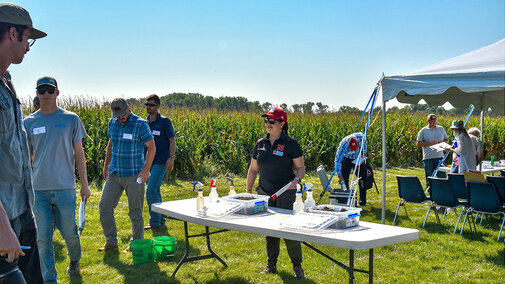A team led by Carolina Córdova, assistant professor and statewide soil health specialist at the University of Nebraska-Lincoln, has unveiled a pioneering protocol for measuring soil organic carbon stocks and changes in cropped and grazed systems. This protocol, developed in collaboration with renowned soil scientists from multiple universities and USDA Agricultural Research Service (ARS) scientists, marks a significant advancement in our understanding and management of soil health and carbon dynamics.
This new soil organic carbon measurement protocol offers several innovative approaches:
- Long-term perspective, emphasizing the importance of long-term monitoring, recognizing that measurable soil organic carbon changes typically require a minimum sampling interval of five to 10 years.
- Comprehensive sampling, outlining strategies for collecting soil samples that accurately represent the area of interest, including guidance on avoiding areas that may skew results.
- Standardized methodology, providing a uniform approach to soil organic carbon measurement, the protocol enables consistent data collection across diverse agricultural landscapes.
Applicability and Implications for Agriculture and Climate Change Mitigation
This protocol represents a crucial step forward in several key areas:
- Enhanced Carbon Sequestration Efforts: The standardized method will support more effective carbon sequestration strategies in agricultural systems (e.g., croplands and grazing lands).
- Improved Climate Modeling: Data collected using this protocol will contribute to more accurate climate models, enhancing our ability to predict and mitigate climate change impacts.
- Sustainable Land Management: Farmers and land managers will be better equipped to make informed decisions about practices that promote soil health and carbon storage.
The development of this protocol is the result of collaborative efforts within the USDA Long-term Agroecosystem Research (LTAR) network. Carolina Córdova, an active member of the LTAR network since 2019, played a key role in leading the elaboration of this first LTAR Soil Organic Carbon Stocks and Change protocol.
“This protocol represents a significant step forward in our ability to accurately measure and monitor soil organic carbon changes over time,” Córdova said. “It is the result of extensive collaboration and will provide valuable insights for both researchers and practitioners in the field.
“The timing is ideal for releasing this protocol, as the USDA is working to establish a new Greenhouse Gas Technical Assistance Provider and Third-Party Verifier Program. This initiative seeks voluntary carbon credit protocols that ensure consistency, reliability, effectiveness, efficiency and transparency in participation within voluntary carbon markets in the USA.”
Looking Ahead
The USDA LTAR network plans to release additional protocols in the near future, further expanding our toolkit for agricultural and environmental research. Researchers and practitioners are encouraged to review the protocol and consider integrating it into their current projects.
Protocol Citation and Link
S Carolina Córdova, Curtis Dell, Mark Liebig, Michel A Cavigelli, David R Huggins, G Philip Robertson 2024. USDA LTAR Common Experiment measurement: Soil organic carbon stocks and change. protocols.io https://dx.doi.org/10.17504/protocols.io.q26g7yo1kgwz/v1
For more information, please contact Carolina Córdova, Ph.D., UNL assistant professor and statewide soil health specialist.

